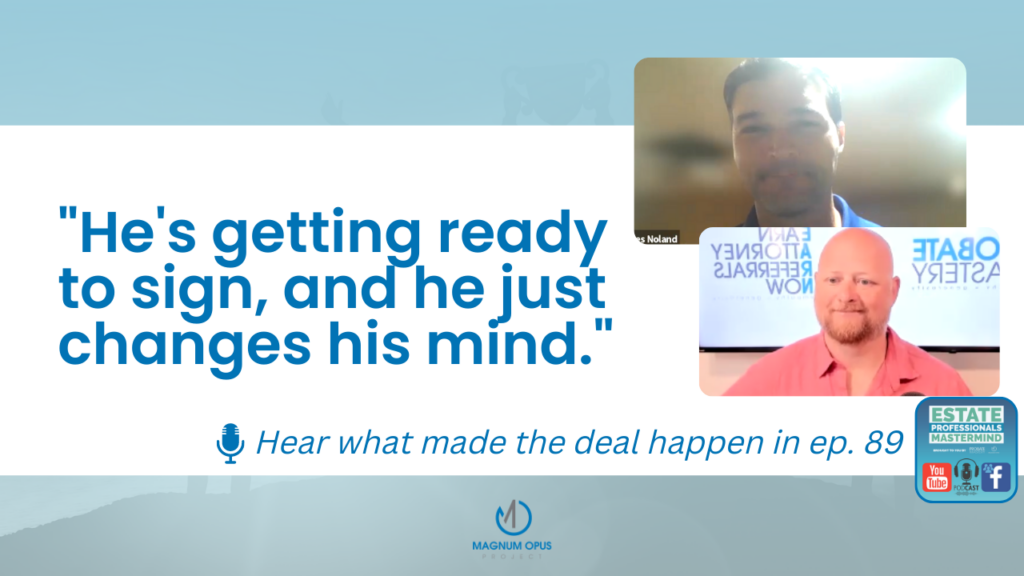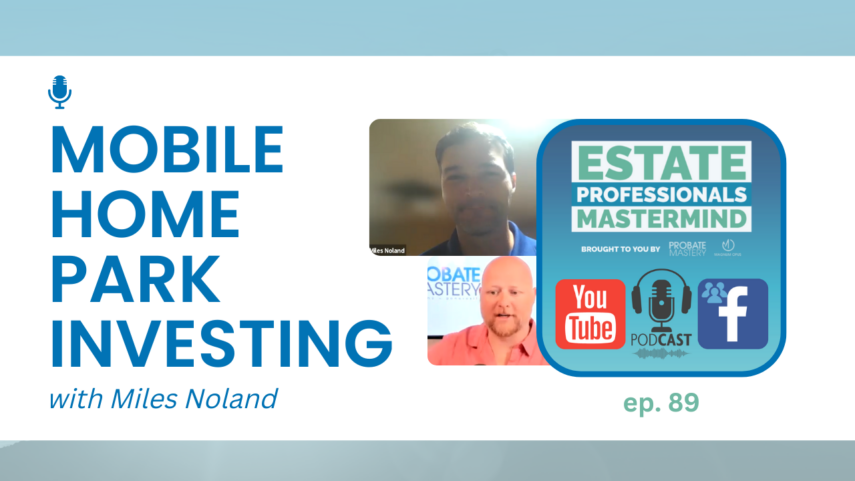Is mobile home park investing a good idea? To help with this summary guide to MPH investing, we interview Miles Noland, a real estate investor specializing in mobile home parks. He shares his story of why he became an investor, his experience purchasing a mobile home park, and the benefits of mobile home park syndications. We also discuss the K-1 tax benefits of a real estate syndication and why past clients are the best private money lenders near you.
Table of Contents:
- Podcast and YouTube Streams
- Is investing in mobile home parks a good idea?
- Owning a mobile home park: Pros and Cons
- How to find and speak with mobile home park owners
- Mobile Home Park deal analysis: Cap rate and valuation
- MPH Syndications and Passive Investing
- K-1 tax benefits of a real estate syndication
- Turning mobile home sellers into private money lenders
- Connect with Miles Noland

Podcast and YouTube Streams: Mobile Home Investing with Miles Noland
Miles Noland is a real estate investor who specializes in mobile home parks. He shares his story of why he became an investor, his experience purchasing a mobile home park, and the benefits of mobile home park syndications. We also discuss the K-1 tax benefits of a real estate syndication and why past clients are the best private money lenders near you.
Noland began his journey into real estate investing to escape the paycheck-to-paycheck lifestyle. He realized that he didn’t want to be a landlord and decided to focus on mobile home parks.
Chad and Miles share that there are numerous benefits to investing in mobile home parks including the potential for high returns, the long-term stability of cash flow, and the fact that it is a “recession-resistant” asset class. They also discuss the process of syndicating a mobile home park deal and the K-1 tax benefits that investors can receive from doing so.
A key takeaway is that one of the best ways to raise private money is by leveraging your past clients. He shares that he has been able to raise millions of dollars from past clients by simply staying in touch with them and letting them know about new opportunities as they arise.
Listen to the podcast or watch the video below.
You can also access the full episode 89 transcript here
Is investing in mobile home parks a good idea?
Mobile home parks have been a popular investment for many years, but with the aging baby boomer demographic, they are becoming an increasingly attractive option. Mobile home parks offer investors the ability to provide affordable housing options for this growing population segment while also generating healthy returns. Plus, many current mobile home park owners are reaching retirement age and might be looking to sell.
There are a number of things to consider when investing in mobile home parks, but the most important is understanding your investment goals. Mobile home park owners are typically looking for a safe and secure investment that will provide them with a steady income stream. In addition, they are also often looking for an investment that will appreciate in value over time.
mobile home parks can be an excellent investment for both novice and experienced investors. However, it is important to do your homework and understand the mobile home market before making any investment decisions.
Watch Miles and Chad discuss the opportunity in Mobile Home Parks as an asset class:
Owning a mobile home park: Pros and Cons
There are a number of benefits to consider when investing in mobile home parks. First, mobile home parks offer investors the ability to generate healthy returns. Mobile home parks typically have lower operating costs than traditional apartments or residential properties, and they are often leased at lower rates. This means that mobile home park owners can enjoy higher net operating incomes and larger cash flows.
Another reason to consider mobile home park investing is that mobile home parks often appreciate in value over time. This appreciation is due to a number of factors, including the increasing demand for mobile homes, the limited supply of mobile home parks, and the fact that mobile home parks are often located in desirable locations.
There are a few potential drawbacks to mobile home park investing. First, mobile home parks can be challenging to finance. Lenders often view mobile home parks as higher-risk investments, so it can be difficult to secure financing for these types of properties.
Another potential drawback is that mobile home parks can be difficult to sell. This is due to the fact that there is often a limited pool of potential buyers for mobile home parks. However, this challenge can be overcome by working with an experienced real estate agent who specializes in mobile home park investing.
Miles Noland shares why he became an MHP investor instead of going the residential route.
How to find and speak with mobile home park owners
If you’re interested in buying a mobile home park, you need to find owners with motivation to sell.
Here are 10 ways to find mobile home park owners:
- Attend mobile home park trade shows
- Browse online listings platforms such as Mobile Home Park World
- Look for For Sale By Owner signs in mobile home parks
- Contact a mobile home park broker
- Search online mobile home park directories
- Check with your local chamber of commerce
- Ask mobile home park residents for referrals
- Try online mobile home park investor forums
- Check with your local mobile home park association
- Try using software like Propstream
Once you’ve found a mobile home park owner that you’re interested in working with, it’s important to have a frank and open conversation. You’ll want to know what their timeline and goals for sale are. Likewise, it’s important that your investment goals and financing make sense.
Listen to Miles and Chad discuss how to speak with mobile home park seller leads.
Mobile Home Park deal analysis: Cap rate and valuation
Once you’ve found a mobile home park that you’re interested in purchasing, it’s important to do a thorough analysis of the deal. This analysis will help you determine whether or not the mobile home park is a good investment.
There are two key components to any mobile home park deal analysis: cap rate and valuation.
The cap rate is the ratio of the mobile home park’s net operating income to its purchase price. The mobile home park’s net operating income is its total income minus its total expenses.
The valuation is the mobile home park’s value based on its potential income and cash flow. The mobile home park’s potential income is its total income minus its vacancy rate. The mobile home park’s cash flow is its potential income minus its total expenses.
You can use these two metrics to compare different mobile home parks and make an informed decision about which one is the best investment for you.
Listen to Miles break down the numbers of his first and subsequent MPH deals.
MPH Syndications and Passive Investing
MHP syndications are a type of investment where a group of investors pool their money together to purchase a mobile home park. This can be a great way to get involved in mobile home park investing without having to come up with the entire purchase price on your own.
MHP syndications typically involve two types of investors: passive and active.
Passive investors are those who provide the capital for the investment but do not take an active role in running the mobile home park.
Active investors are those who not only provide the capital for the investment but also take an active role in running the mobile home park.
Both passive and active investors can make a lot of money from mobile home park syndications. However, it’s important to understand the risks and rewards of each type of investment before you decide which one is right for you.
See more: Building a segmented cash buyers list
Learn about how Miles and Chad use joint ventures and syndications to invest in asset classes like mobile home/RV parks.
K-1 tax benefits of a real estate syndication
When you invest in a mobile home park syndication, you may be eligible for certain tax benefits.
Specifically, you may be able to take advantage of the K-1 tax benefit.
The K-1 tax benefit allows you to deduct your share of the mobile home park’s expenses on your personal income tax return.
This can help you save a significant amount of money on your taxes.
To learn more about how a K-1 tax benefit could apply to your situation, speak with a qualified tax professional in your market.
Chad Corbett discusses how first-year losses on a MHP investment can be great for W2 wage earners.
Why past clients are the best private money lenders near you
On one hand, the current owner of a mobile park you want to buy could become your private lender through the form of seller financing.
You’ll first need to make sure that the mobile home park owner is willing to lend you the money. Second, you’ll need to negotiate a fair interest rate. And third, you’ll need to put together a solid business plan that will convince the mobile home park owner to lend you the money.
In addition to owner finance, you can also invite the seller to invest in future deals. Though they might not want to actively manage investment assets anymore, they might be interested in becoming a private lender or passively investing in syndications.
Always ask! The best private lenders near you are probably your past clients.
Miles turns a former mobile park owner into a private lender and Chad emphasizes why more people need to do this:
Connect with Miles Noland
Investing in mobile home parks can be a great way to earn high returns and stabilize your cash flow over the long term. If you’re thinking about syndicating a deal, remember to take advantage of the K-1 tax benefits that come along with it. And when it comes time to raise private money for your next deal, don’t forget to tap into your network of past clients – they just might be your best source of funding!
Make sure you watch this episode, grab Miles’ free guide, and join our free Mastermind Group!
See More: Turning a single residential property into space for dry camping rentals.

